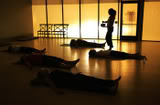
Two recently published articles reveal that yoga is beneficial for insomnia in both pre and post menopausal women. The first study, documented in the Journal of Clinical Oncology revealed the benefits of yoga on cancer survivors. Practicing yoga helped participants who have had cancer sleep better and reduce their use of sleep aids.
Researchers from the James P. Wilmot Cancer Center at the University of Rochester Medical Center in New York found study participants, mostly women with a history of breast cancer, reported significant improvements in sleep quality and sleep duration when they attended yoga sessions twice per week over a four week period.
The study included 410 people with a history of cancer who were recruited from 12 U.S. cities. Participants were 54 years old, on average. Almost all were white and female, and three quarters had had breast cancer. Participants were randomly assigned to one of two groups. Half of them attended a standardized yoga program for cancer survivors that met for 75 minutes twice a week, in addition to receiving standard care. The other half received only standard care.
In addition to a participant before and after questionnaire that assessed sleep quality, researchers used actigraphy, a sensor that detects movement and is worn like a wristwatch at night. Yoga participants reduced their use of sleep medication by 21 percent per week, on average, and those not assigned to yoga increased use of sleep aids by five percent per week. For more information click here.
In the second study, conducted at the Group Health Research Institute, researchers showed that a 12-week yoga class and practicing the same at home resulted in reduced insomnia. But yoga practice did not seem to reduce hot flashes or night sweats among menopausal women.
During menopause twice as many women suffer from insomnia that not only affects the quality of life but also lowers a person’s memory and concentration. Insomnia, depression and sleep apnea are common problems that women start facing before the onset of menopause.
“Many women suffer from insomnia during menopause, and it’s good to know that yoga may help them,” said the study’s author, Dr. Karen Newton. Researchers concentrated on the effects of three natural approaches namely yoga, fish oil and exercise on menopausal symptoms.
The study was conducted on 249 healthy women divided into three groups -one who performed yoga, a moderate aerobic exercise program group and one control group, which did no exercises. The groups were also randomly given omega-3 fatty acid supplement or a placebo. The yoga group had a statistically high compliance rate, which translates to the assumption that the womenin the study enjoyed their yoga practice!
The researchers noticed that exercise slightly improved sleep, insomnia and depression whereas yoga was associated with better sleep quality and less depression but the effects were not statistically significant. The intake of omega 3 did not improve hot flashes, night sweats, mood and sleep.
Similar to the latest finding, a previous study published in the journal Menopause revealed that a couple of yoga sessions a week ease sleeping problems and associated climacteric problems (Symptoms associated with menopause) in postmenopausal women insomnia. To read the full study click here.
 LifeForce Yoga offers a guided Yoga Nidra CD which is a wonderful tool for relaxation and sleep. Yoga Nidra is a form of meditative self-inquiry that, while relaxing the body, opens the mind to greater discernment and self-awareness, and the heart to love and acceptance of what is. It is a powerful tool for clearing away your limiting beliefs and emotions and for living from a more balanced (sattvic) state of mind.
LifeForce Yoga offers a guided Yoga Nidra CD which is a wonderful tool for relaxation and sleep. Yoga Nidra is a form of meditative self-inquiry that, while relaxing the body, opens the mind to greater discernment and self-awareness, and the heart to love and acceptance of what is. It is a powerful tool for clearing away your limiting beliefs and emotions and for living from a more balanced (sattvic) state of mind.
To learn a meditative meditative yoga practice from a LifeForce Yoga Practitioner, please click here to find an LFYP near you!